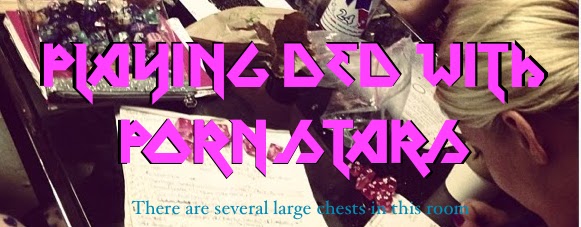But no. Too often game stuff is literally worse than useless--the time you spend reading it is more time than it could take to make something up that was equally good.
Although I've harped on this for years, it still amazes me that you can get like a 60-page RPG supplement called something totally up your alley and juicy like "Spider Queens of the Devil Maze" and flip through it for ten seconds and then not only turn away in disgust, but be 100% sure you were justified in doing that. And that this is normal.
Going through all this WOTC and TSR stuff I'm definitely amazed and almost impressed how few genuinely gameable ideas manage to get communicated in these texts.
How do they do it? I went through and tried to figure out the most important bits:
1. Pretend a standard monster in a standard room is an encounter worth paying for.
This is the biggest one by far: Yes, it is fun to fight an ogre in a room, but it is not fun to pay to be told that there's an ogre in a room, especially not for 8 paragraphs. The idea that an ogre can be in a room is logically implied by the ogre being in the Monster Manual, which you probably already own.
If I am actually paying for it--the environment should be complex, the creature should be complex or both.
Of course, many fine products include encounters which are a standard creature in an environment, but they do this without sucking because they avoid making mistake #2...
2. Write out mundane or obvious details, so it takes forever to tell you there's a standard monster in a standard room.
The length of an encounter's description should be-, and rarely is-, proportional to its depth. For example.
Another example, from Waterdeep: High-HD skeletons that can cause darkness, riding on skeletal horses attack in a darkened wood. They try to capture someone you're chilling with and bring them to the bad guy.
That is literally everything you need to know about that encounter. It's a spooky encounter, totally legit--it takes a whole fucking page for the author to get across what I wrote in two sentences.
3. Pretend reskinning a monster is worth paying for
This is more an issue with independently produced content than with WOTC and TSR: making the orc throwing axes into a cyborg clown throwing pies with exactly the same stats and vulnerabilities isn't actually doing a hell of a lot. The creature still is dealt with, tactically, the same, and still requires the same kind of thinking to defeat. New things should be new.
4. Don't let the art do any of the heavy lifting
Lots of RPGs have bad art and that's not news, but the more heartbreaking issue here is how the art so rarely provides the module writer any help. Things that could be explained with art are instead explained with words. Or worse--both, wasting time and space.
"It looks like this" beats boxed text. A diagram of what's in a room when it's searched is better than 3 pages describing it.
Kelvin Green's Forgive Us is a great and rare example of a module where the visuals actually help the writer get across details that would've taken paragraphs to explain otherwise.
5. Be squeamish about adding special rules and tables
Unique situations are rarely set apart with special rules, tables or procedures, generally out of some misguided attempt to present the system as capable of anything as-is.
If you're using a module and you, by definition, have the book right there in front of you then you're not creating any new inconvenience by introducing a one-time-alteration in how things work. The GM's already looking at it.
There's also a related problem where unique effects are described as stacked (but unalterable) piles of standard spells. So instead of just going "magic won't work here" they go "There is an anti-magic spell whose radius has been altered with an alter-radius spell to encompass only the room and which has a permanency spell on it and...".
6. Use boxed text.
Some people defend boxed text on the grounds that that it teaches newbies how to describe things. The problem is:
-That only explains why there should be one instance of boxed text at the beginning of the book, not why there should be dozens all over it.
-It teaches GMs to read stuff out of a book, which lesson is 1000 times more bad than the lesson of how to describe things is good. I'd rather have a GM go "It's a fucking room" spontaneously than give a 300-word description from a book.
-It ruins a perfectly good opportunity to have a picture of something rather than a generic image of a palace guard looking mustachey.
7. Include lots of standard magic items.
Magic items should be weird and have disadvantages, every second spent describing one that isn't like that is pages we don't need. Even if they weren't utter shit, they're already in the DMG.
Here's a good idea someone had: Huge Ruined Scott had a kingdom where the crown was (unknown to anyone) a Helm of Opposite Alignment. So it explained why all the General Ulysses S Grants turned into President Ulysses S Grants and the murder-hungry coup-leaders turned into even-keeled moderates. That's worth paying for. A +3 spear super isn't.
8. Makes sure the game-specific cosmology is always lazily written.
As soon as anything interacts with a god in a D&D module, everyone falls asleep. Pages and pages of description just basically amount to "Here are the parts of pop Protestantism that are in this adventure". The God of Murder is not going to go easier on you because you murdered 8 orcs the day before, the Goddess of Light is just nice, she doesn't actually care more about the PC carrying a torch than the one casting Darkness, the goblins do not wear masks in church for fear of their terrible goblin god knowing their faces.
Love or hate Vancian magic, its paraphernalia--the scrolls, books, wizard schools--are lovingly and (relatively) creatively described in D&D. Clerics and anyone interacting with them just get these interchangeable cultures. Priests are good or bad, churches are vaguer versions of real history, rituals take only time and mcguffins.
9. Make monsters that are just hit point bags
...so a lot of surface complexity is generated by things which have no real effect. Like this party is three hobgoblins and three goblins but this one's four goblins. It doesn't fucking matter because there are no playable cultural or biological differences encoded into these creatures.
WOTC tried to give different hit-point-bag monsters different tactics and die mechanics, but they never had anything to do with a different essential conception of the creature, so in the end the connection between a hobgoblin and their way of hitting you was just arbitrary. The orcs mob you the hobgoblins hit and run. Sure, whatever.
10. ...and make sure they all have statblocks
Statblocks take up way too much space in everything. There are whole games that wouldn't amount to more than a handful of pages if it wasn't for the fact "A horse is faster than a person and has more hit points" is technically expressed in a different way in their game than it is in D&D. A statblock is a tool of convenience, it is not a new idea.
Unless an enemy has nonstandard powers, its playable stats can fit in two lines, in any game, maximum.
11. Structure it as either railroad or 100% location-based, include no other options described in any detail
Ideally, modules should be the perfect place for experienced writer/GMs to give examples of how to simultaneously prep complex and structurally sophisticated content while also allowing players freedom and flexibility about how to proceed. There should be flowcharts or diagrams or if/thens. And...there isn't.
Location-based adventures (nonlinear dungeons with branching paths, hexcrawls) are great because they provide structure for you. Cool. But what if you have, say, one intelligent NPC who escapes the party and starts making plans? Then you have to move beyond the pure location-based adventure. But then the only other kind of adventure typically presented is the event-based railroad--which amputates any discussion of how to structure an adventure. You just follow the breadcrumbs.
So if you are reading anything other than a location-based adventure you have to ignore half the text as it's just advice on how to railroad the players back to the event chain.
So one of the few things a module might actually be good for, they hardly ever do. It's crazy that after 30 years of horror and investigative game modules I had to write out how Hunter/Hunted works on a goddamn blog.
12. Make sure your information and graphic design sucks.
Duh.
-------
So what's left in a standard module when you scrape out all the pork cracklins? Here's the first 6 pages of TSR's Wonders of Lankhmar:
Adventure one: Each of the five-fingers of a five-fingered magic item is hidden in a different place. The NPC who initially brings a single piece to you is secretly commissioned by those who owned the piece to kill you once all 5 pieces are discovered.
Adventure two: The target you are supposed to arrest then offers you double to arrest your patron.
Neither of those is revolutionary genius but those are both ideas worth paying for--produce 20 more of them and you've got yourself a whole page worth of content a decent human being would be able to sleep with themselves at night after pawning off on someone. Better yet, take one of those ideas and flesh out the details with other ideas that themselves are interesting (make the NPC who commissions the party interesting, make the target interesting, make the locations they live in interesting, stop using fucking "guard dogs 2hd"), so that instead of just a page full of adventure seeds, you get something worth like $11.95 or whatever.
-
-












